ENTR301: Entrepreneurship and Small Business Management Report
VerifiedAdded on 2020/10/05
|17
|4897
|488
Report
AI Summary
This report provides a comprehensive overview of entrepreneurship and small business management. It begins by defining entrepreneurship and exploring various types of entrepreneurial ventures, including small businesses, scalable start-ups, large companies, social enterprises, and different typologies like female, lifestyle, and serial entrepreneurship. The report then analyzes the similarities and differences between these ventures. The second part of the report delves into the impact of micro and small businesses on the economy, highlighting their contribution to turnover, growth, and employment in the UK. It also examines the importance of small businesses and start-ups in fostering the growth of the social economy, emphasizing their adaptability and role in developing personal relationships and growth opportunities. The report concludes by exploring the characteristics, traits, and skills of successful entrepreneurs and how their background and experiences can influence their entrepreneurial journey. This report provides valuable insights into the world of entrepreneurship and the critical role small businesses play in economic and social development.

Entrepreneurship and Small
Business Management
Business Management
Paraphrase This Document
Need a fresh take? Get an instant paraphrase of this document with our AI Paraphraser
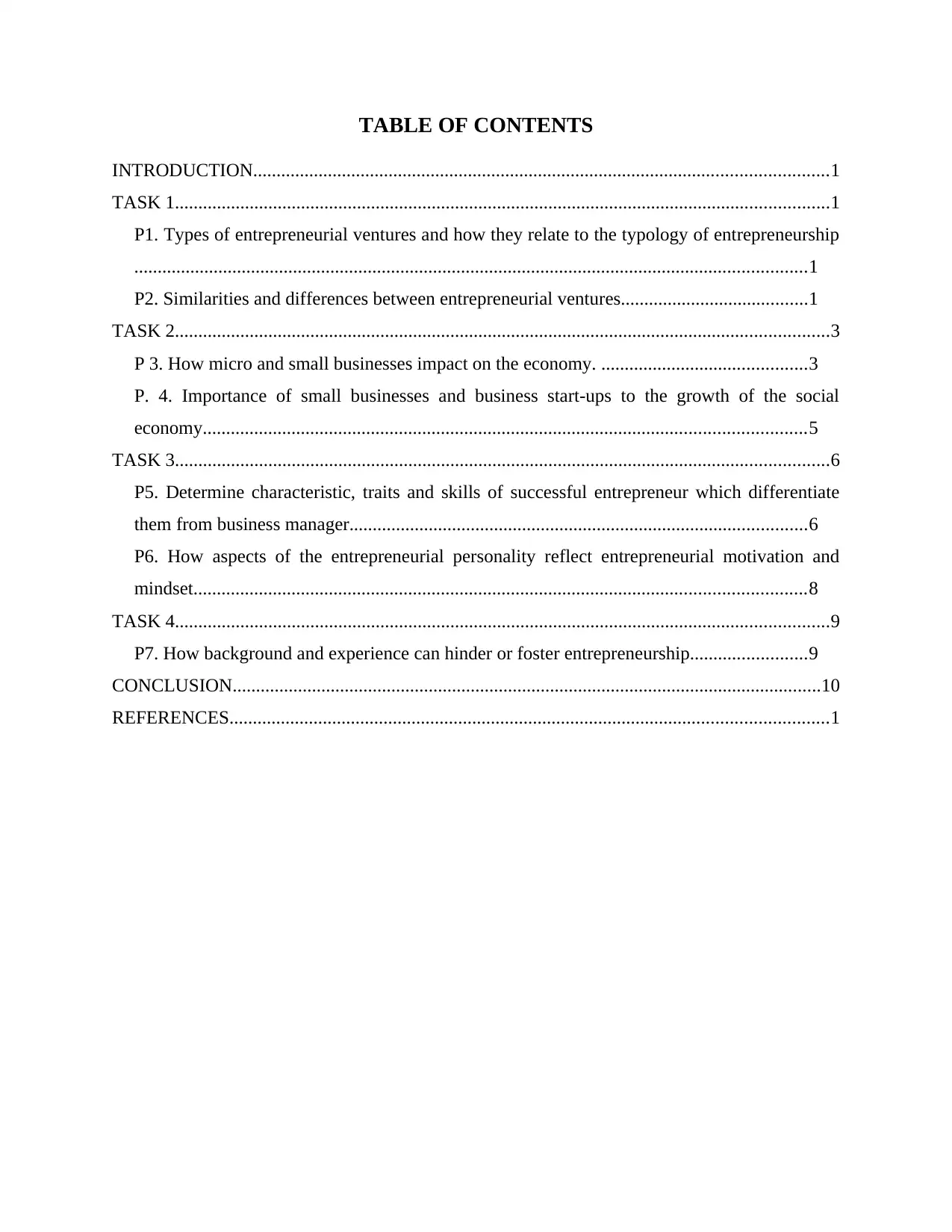
TABLE OF CONTENTS
INTRODUCTION...........................................................................................................................1
TASK 1............................................................................................................................................1
P1. Types of entrepreneurial ventures and how they relate to the typology of entrepreneurship
................................................................................................................................................1
P2. Similarities and differences between entrepreneurial ventures........................................1
TASK 2............................................................................................................................................3
P 3. How micro and small businesses impact on the economy. ............................................3
P. 4. Importance of small businesses and business start-ups to the growth of the social
economy.................................................................................................................................5
TASK 3............................................................................................................................................6
P5. Determine characteristic, traits and skills of successful entrepreneur which differentiate
them from business manager..................................................................................................6
P6. How aspects of the entrepreneurial personality reflect entrepreneurial motivation and
mindset...................................................................................................................................8
TASK 4............................................................................................................................................9
P7. How background and experience can hinder or foster entrepreneurship.........................9
CONCLUSION..............................................................................................................................10
REFERENCES................................................................................................................................1
INTRODUCTION...........................................................................................................................1
TASK 1............................................................................................................................................1
P1. Types of entrepreneurial ventures and how they relate to the typology of entrepreneurship
................................................................................................................................................1
P2. Similarities and differences between entrepreneurial ventures........................................1
TASK 2............................................................................................................................................3
P 3. How micro and small businesses impact on the economy. ............................................3
P. 4. Importance of small businesses and business start-ups to the growth of the social
economy.................................................................................................................................5
TASK 3............................................................................................................................................6
P5. Determine characteristic, traits and skills of successful entrepreneur which differentiate
them from business manager..................................................................................................6
P6. How aspects of the entrepreneurial personality reflect entrepreneurial motivation and
mindset...................................................................................................................................8
TASK 4............................................................................................................................................9
P7. How background and experience can hinder or foster entrepreneurship.........................9
CONCLUSION..............................................................................................................................10
REFERENCES................................................................................................................................1
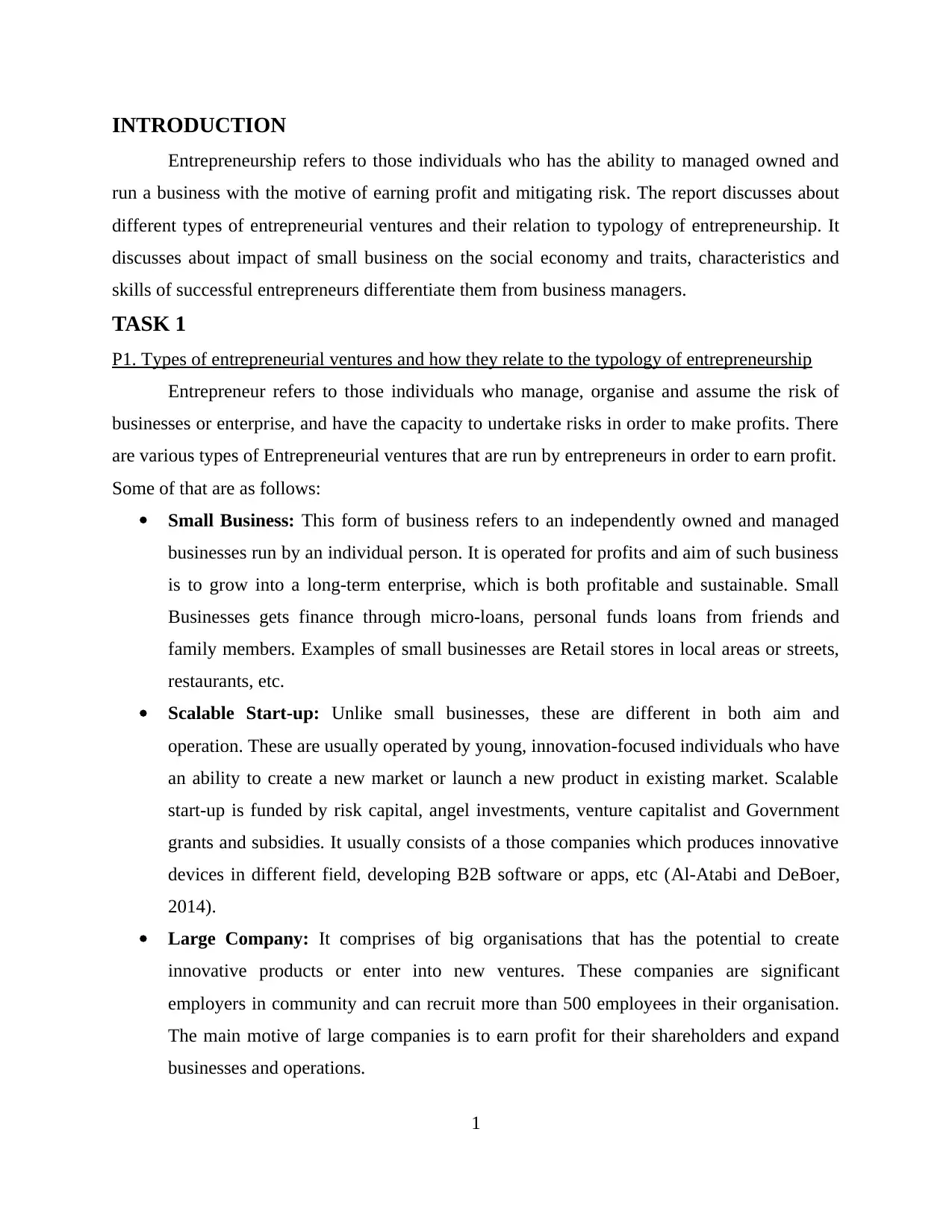
INTRODUCTION
Entrepreneurship refers to those individuals who has the ability to managed owned and
run a business with the motive of earning profit and mitigating risk. The report discusses about
different types of entrepreneurial ventures and their relation to typology of entrepreneurship. It
discusses about impact of small business on the social economy and traits, characteristics and
skills of successful entrepreneurs differentiate them from business managers.
TASK 1
P1. Types of entrepreneurial ventures and how they relate to the typology of entrepreneurship
Entrepreneur refers to those individuals who manage, organise and assume the risk of
businesses or enterprise, and have the capacity to undertake risks in order to make profits. There
are various types of Entrepreneurial ventures that are run by entrepreneurs in order to earn profit.
Some of that are as follows:
Small Business: This form of business refers to an independently owned and managed
businesses run by an individual person. It is operated for profits and aim of such business
is to grow into a long-term enterprise, which is both profitable and sustainable. Small
Businesses gets finance through micro-loans, personal funds loans from friends and
family members. Examples of small businesses are Retail stores in local areas or streets,
restaurants, etc.
Scalable Start-up: Unlike small businesses, these are different in both aim and
operation. These are usually operated by young, innovation-focused individuals who have
an ability to create a new market or launch a new product in existing market. Scalable
start-up is funded by risk capital, angel investments, venture capitalist and Government
grants and subsidies. It usually consists of a those companies which produces innovative
devices in different field, developing B2B software or apps, etc (Al-Atabi and DeBoer,
2014).
Large Company: It comprises of big organisations that has the potential to create
innovative products or enter into new ventures. These companies are significant
employers in community and can recruit more than 500 employees in their organisation.
The main motive of large companies is to earn profit for their shareholders and expand
businesses and operations.
1
Entrepreneurship refers to those individuals who has the ability to managed owned and
run a business with the motive of earning profit and mitigating risk. The report discusses about
different types of entrepreneurial ventures and their relation to typology of entrepreneurship. It
discusses about impact of small business on the social economy and traits, characteristics and
skills of successful entrepreneurs differentiate them from business managers.
TASK 1
P1. Types of entrepreneurial ventures and how they relate to the typology of entrepreneurship
Entrepreneur refers to those individuals who manage, organise and assume the risk of
businesses or enterprise, and have the capacity to undertake risks in order to make profits. There
are various types of Entrepreneurial ventures that are run by entrepreneurs in order to earn profit.
Some of that are as follows:
Small Business: This form of business refers to an independently owned and managed
businesses run by an individual person. It is operated for profits and aim of such business
is to grow into a long-term enterprise, which is both profitable and sustainable. Small
Businesses gets finance through micro-loans, personal funds loans from friends and
family members. Examples of small businesses are Retail stores in local areas or streets,
restaurants, etc.
Scalable Start-up: Unlike small businesses, these are different in both aim and
operation. These are usually operated by young, innovation-focused individuals who have
an ability to create a new market or launch a new product in existing market. Scalable
start-up is funded by risk capital, angel investments, venture capitalist and Government
grants and subsidies. It usually consists of a those companies which produces innovative
devices in different field, developing B2B software or apps, etc (Al-Atabi and DeBoer,
2014).
Large Company: It comprises of big organisations that has the potential to create
innovative products or enter into new ventures. These companies are significant
employers in community and can recruit more than 500 employees in their organisation.
The main motive of large companies is to earn profit for their shareholders and expand
businesses and operations.
1
⊘ This is a preview!⊘
Do you want full access?
Subscribe today to unlock all pages.

Trusted by 1+ million students worldwide

Social Entrepreneurship: Businesses which are built with the motive of creating
innovative products. Further, they have the aim and desire to make the world a better
place. Social Entrepreneurship lays emphasis on maximising sustainable development.
These enterprises can be in the form of Non-profit firms, Profit companies or Hybrid.
2
innovative products. Further, they have the aim and desire to make the world a better
place. Social Entrepreneurship lays emphasis on maximising sustainable development.
These enterprises can be in the form of Non-profit firms, Profit companies or Hybrid.
2
Paraphrase This Document
Need a fresh take? Get an instant paraphrase of this document with our AI Paraphraser
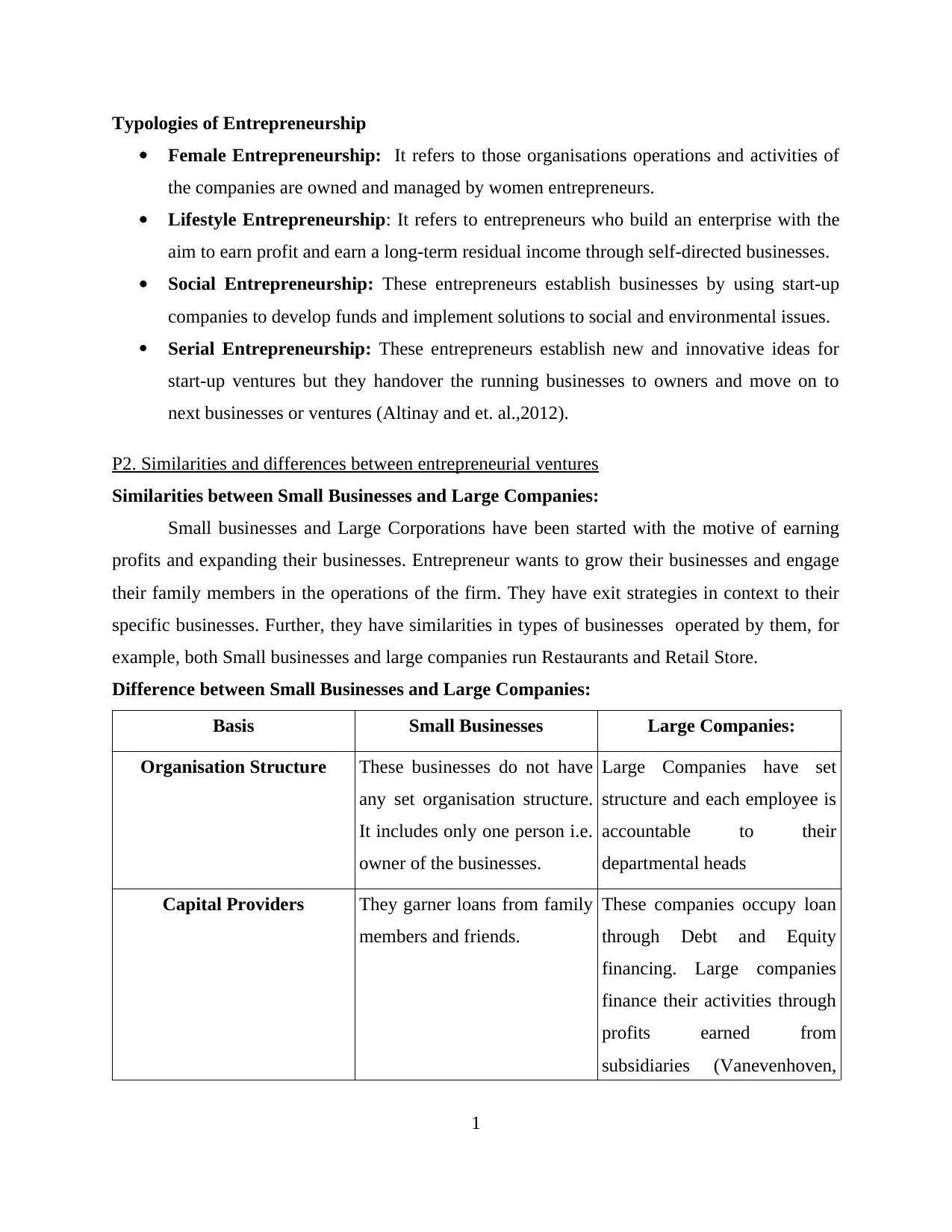
Typologies of Entrepreneurship
Female Entrepreneurship: It refers to those organisations operations and activities of
the companies are owned and managed by women entrepreneurs.
Lifestyle Entrepreneurship: It refers to entrepreneurs who build an enterprise with the
aim to earn profit and earn a long-term residual income through self-directed businesses.
Social Entrepreneurship: These entrepreneurs establish businesses by using start-up
companies to develop funds and implement solutions to social and environmental issues.
Serial Entrepreneurship: These entrepreneurs establish new and innovative ideas for
start-up ventures but they handover the running businesses to owners and move on to
next businesses or ventures (Altinay and et. al.,2012).
P2. Similarities and differences between entrepreneurial ventures
Similarities between Small Businesses and Large Companies:
Small businesses and Large Corporations have been started with the motive of earning
profits and expanding their businesses. Entrepreneur wants to grow their businesses and engage
their family members in the operations of the firm. They have exit strategies in context to their
specific businesses. Further, they have similarities in types of businesses operated by them, for
example, both Small businesses and large companies run Restaurants and Retail Store.
Difference between Small Businesses and Large Companies:
Basis Small Businesses Large Companies:
Organisation Structure These businesses do not have
any set organisation structure.
It includes only one person i.e.
owner of the businesses.
Large Companies have set
structure and each employee is
accountable to their
departmental heads
Capital Providers They garner loans from family
members and friends.
These companies occupy loan
through Debt and Equity
financing. Large companies
finance their activities through
profits earned from
subsidiaries (Vanevenhoven,
1
Female Entrepreneurship: It refers to those organisations operations and activities of
the companies are owned and managed by women entrepreneurs.
Lifestyle Entrepreneurship: It refers to entrepreneurs who build an enterprise with the
aim to earn profit and earn a long-term residual income through self-directed businesses.
Social Entrepreneurship: These entrepreneurs establish businesses by using start-up
companies to develop funds and implement solutions to social and environmental issues.
Serial Entrepreneurship: These entrepreneurs establish new and innovative ideas for
start-up ventures but they handover the running businesses to owners and move on to
next businesses or ventures (Altinay and et. al.,2012).
P2. Similarities and differences between entrepreneurial ventures
Similarities between Small Businesses and Large Companies:
Small businesses and Large Corporations have been started with the motive of earning
profits and expanding their businesses. Entrepreneur wants to grow their businesses and engage
their family members in the operations of the firm. They have exit strategies in context to their
specific businesses. Further, they have similarities in types of businesses operated by them, for
example, both Small businesses and large companies run Restaurants and Retail Store.
Difference between Small Businesses and Large Companies:
Basis Small Businesses Large Companies:
Organisation Structure These businesses do not have
any set organisation structure.
It includes only one person i.e.
owner of the businesses.
Large Companies have set
structure and each employee is
accountable to their
departmental heads
Capital Providers They garner loans from family
members and friends.
These companies occupy loan
through Debt and Equity
financing. Large companies
finance their activities through
profits earned from
subsidiaries (Vanevenhoven,
1
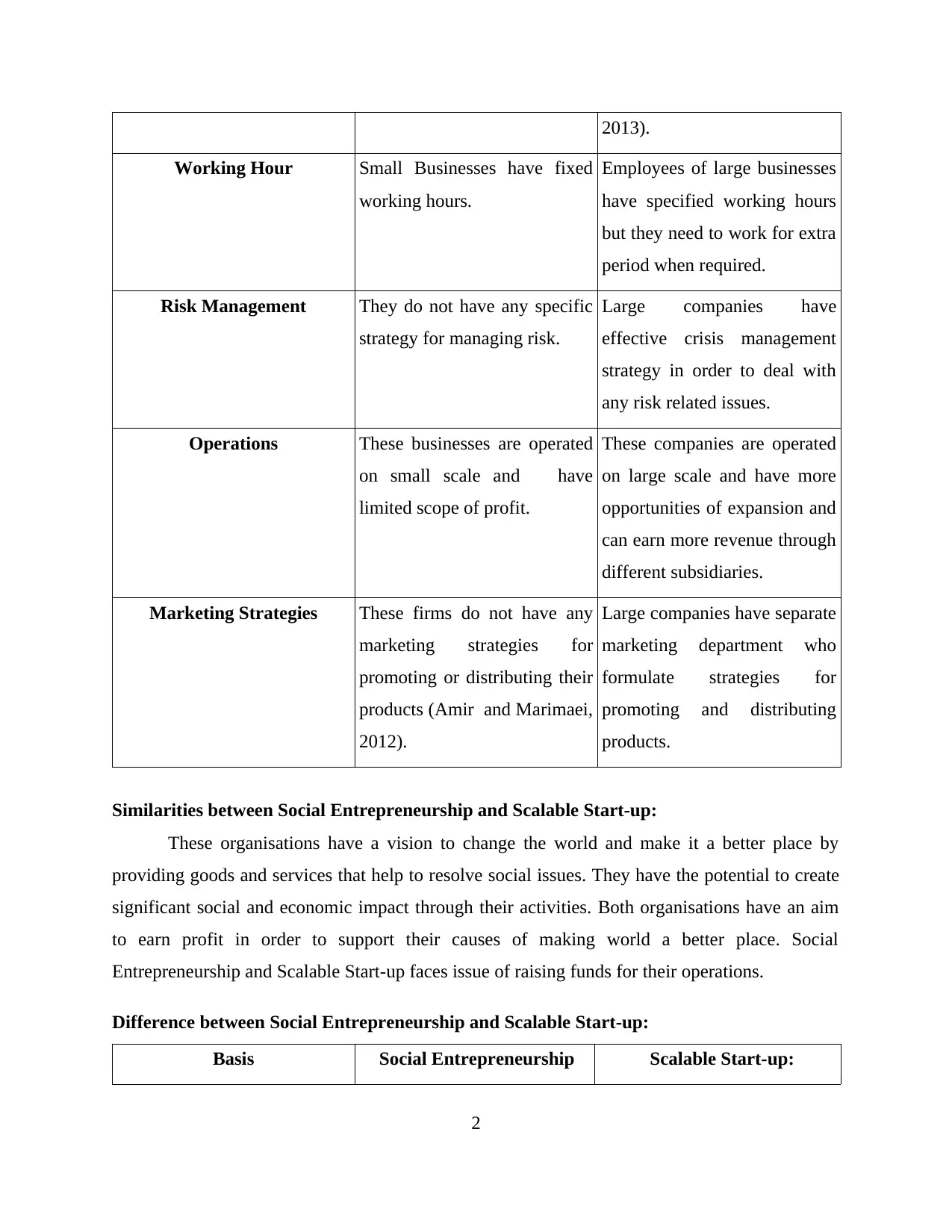
2013).
Working Hour Small Businesses have fixed
working hours.
Employees of large businesses
have specified working hours
but they need to work for extra
period when required.
Risk Management They do not have any specific
strategy for managing risk.
Large companies have
effective crisis management
strategy in order to deal with
any risk related issues.
Operations These businesses are operated
on small scale and have
limited scope of profit.
These companies are operated
on large scale and have more
opportunities of expansion and
can earn more revenue through
different subsidiaries.
Marketing Strategies These firms do not have any
marketing strategies for
promoting or distributing their
products (Amir and Marimaei,
2012).
Large companies have separate
marketing department who
formulate strategies for
promoting and distributing
products.
Similarities between Social Entrepreneurship and Scalable Start-up:
These organisations have a vision to change the world and make it a better place by
providing goods and services that help to resolve social issues. They have the potential to create
significant social and economic impact through their activities. Both organisations have an aim
to earn profit in order to support their causes of making world a better place. Social
Entrepreneurship and Scalable Start-up faces issue of raising funds for their operations.
Difference between Social Entrepreneurship and Scalable Start-up:
Basis Social Entrepreneurship Scalable Start-up:
2
Working Hour Small Businesses have fixed
working hours.
Employees of large businesses
have specified working hours
but they need to work for extra
period when required.
Risk Management They do not have any specific
strategy for managing risk.
Large companies have
effective crisis management
strategy in order to deal with
any risk related issues.
Operations These businesses are operated
on small scale and have
limited scope of profit.
These companies are operated
on large scale and have more
opportunities of expansion and
can earn more revenue through
different subsidiaries.
Marketing Strategies These firms do not have any
marketing strategies for
promoting or distributing their
products (Amir and Marimaei,
2012).
Large companies have separate
marketing department who
formulate strategies for
promoting and distributing
products.
Similarities between Social Entrepreneurship and Scalable Start-up:
These organisations have a vision to change the world and make it a better place by
providing goods and services that help to resolve social issues. They have the potential to create
significant social and economic impact through their activities. Both organisations have an aim
to earn profit in order to support their causes of making world a better place. Social
Entrepreneurship and Scalable Start-up faces issue of raising funds for their operations.
Difference between Social Entrepreneurship and Scalable Start-up:
Basis Social Entrepreneurship Scalable Start-up:
2
⊘ This is a preview!⊘
Do you want full access?
Subscribe today to unlock all pages.

Trusted by 1+ million students worldwide
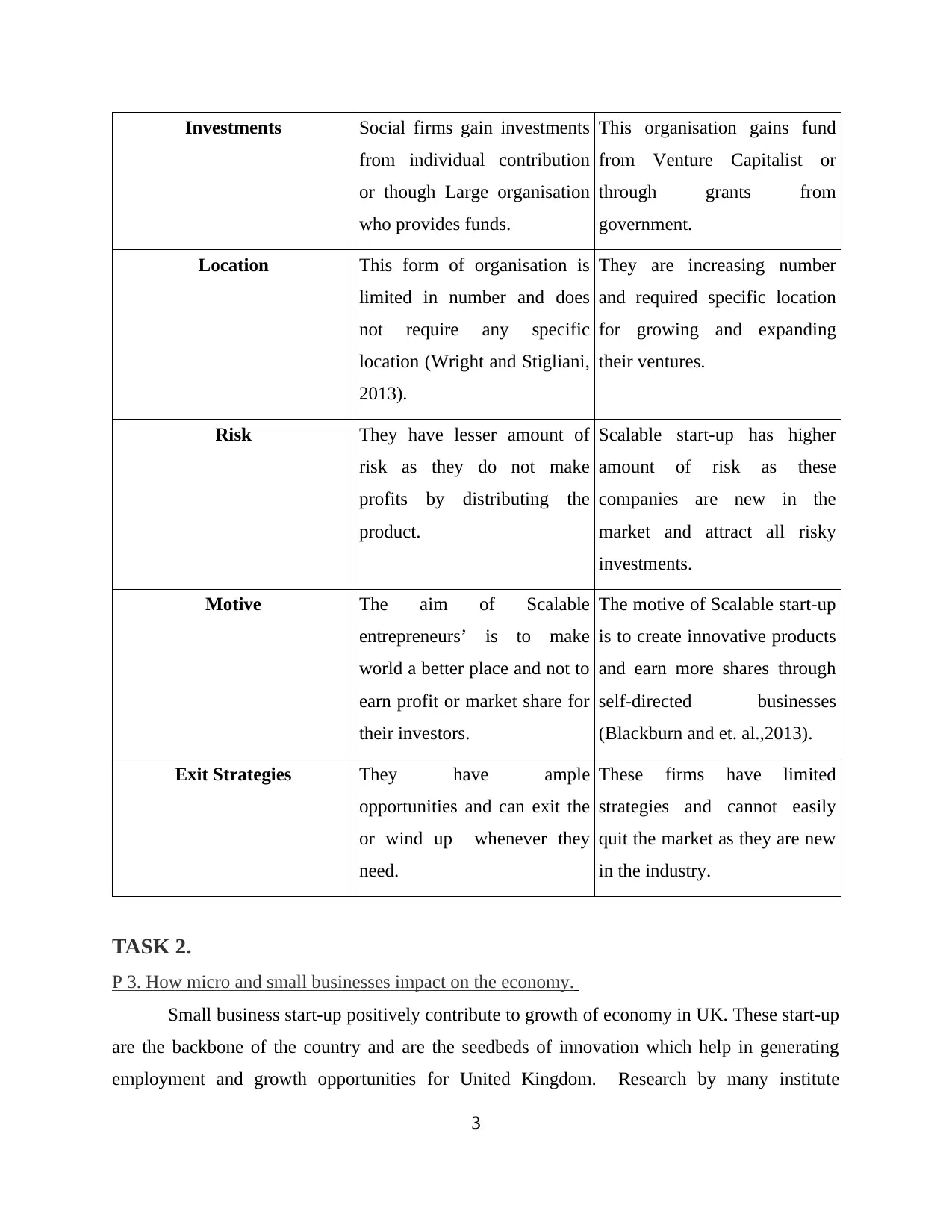
Investments Social firms gain investments
from individual contribution
or though Large organisation
who provides funds.
This organisation gains fund
from Venture Capitalist or
through grants from
government.
Location This form of organisation is
limited in number and does
not require any specific
location (Wright and Stigliani,
2013).
They are increasing number
and required specific location
for growing and expanding
their ventures.
Risk They have lesser amount of
risk as they do not make
profits by distributing the
product.
Scalable start-up has higher
amount of risk as these
companies are new in the
market and attract all risky
investments.
Motive The aim of Scalable
entrepreneurs’ is to make
world a better place and not to
earn profit or market share for
their investors.
The motive of Scalable start-up
is to create innovative products
and earn more shares through
self-directed businesses
(Blackburn and et. al.,2013).
Exit Strategies They have ample
opportunities and can exit the
or wind up whenever they
need.
These firms have limited
strategies and cannot easily
quit the market as they are new
in the industry.
TASK 2.
P 3. How micro and small businesses impact on the economy.
Small business start-up positively contribute to growth of economy in UK. These start-up
are the backbone of the country and are the seedbeds of innovation which help in generating
employment and growth opportunities for United Kingdom. Research by many institute
3
from individual contribution
or though Large organisation
who provides funds.
This organisation gains fund
from Venture Capitalist or
through grants from
government.
Location This form of organisation is
limited in number and does
not require any specific
location (Wright and Stigliani,
2013).
They are increasing number
and required specific location
for growing and expanding
their ventures.
Risk They have lesser amount of
risk as they do not make
profits by distributing the
product.
Scalable start-up has higher
amount of risk as these
companies are new in the
market and attract all risky
investments.
Motive The aim of Scalable
entrepreneurs’ is to make
world a better place and not to
earn profit or market share for
their investors.
The motive of Scalable start-up
is to create innovative products
and earn more shares through
self-directed businesses
(Blackburn and et. al.,2013).
Exit Strategies They have ample
opportunities and can exit the
or wind up whenever they
need.
These firms have limited
strategies and cannot easily
quit the market as they are new
in the industry.
TASK 2.
P 3. How micro and small businesses impact on the economy.
Small business start-up positively contribute to growth of economy in UK. These start-up
are the backbone of the country and are the seedbeds of innovation which help in generating
employment and growth opportunities for United Kingdom. Research by many institute
3
Paraphrase This Document
Need a fresh take? Get an instant paraphrase of this document with our AI Paraphraser
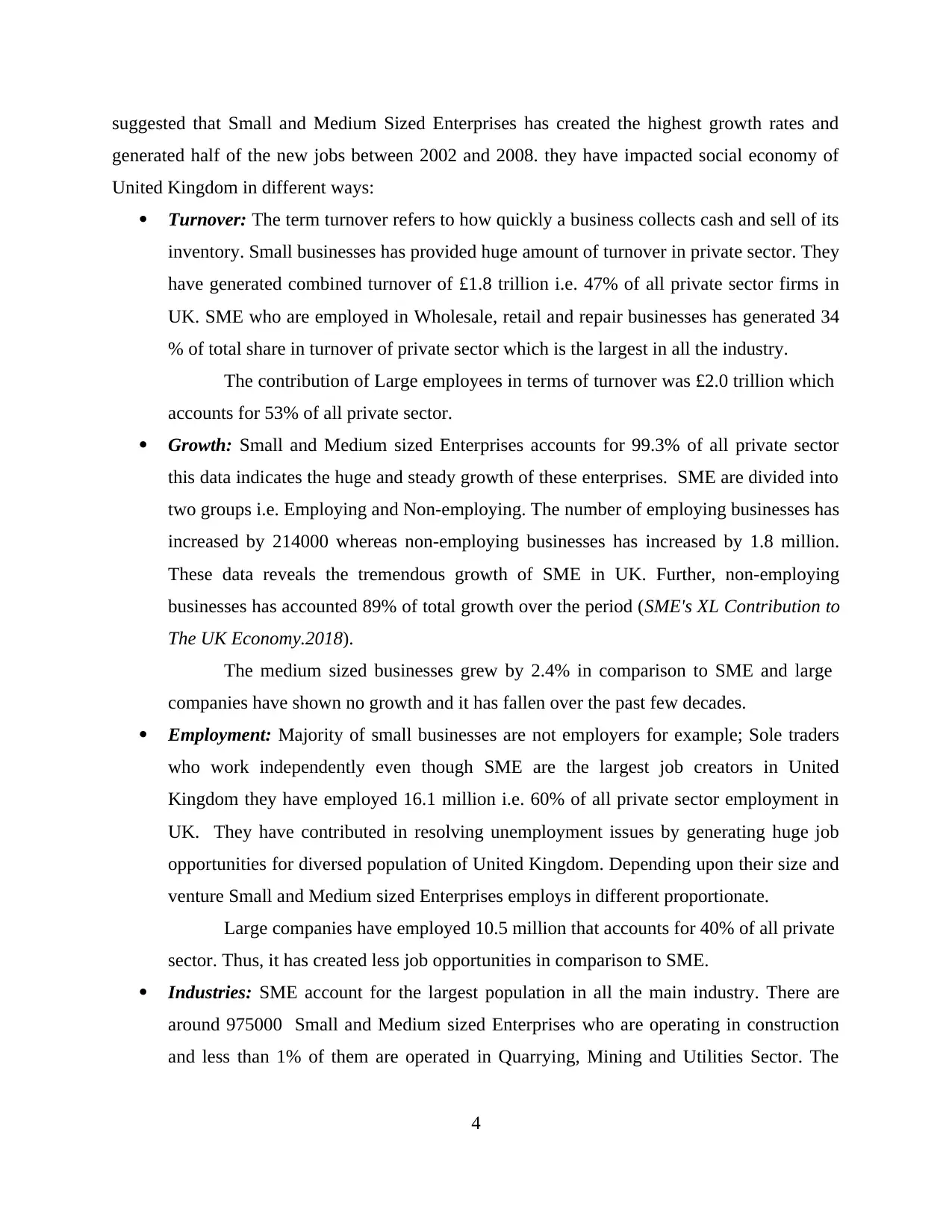
suggested that Small and Medium Sized Enterprises has created the highest growth rates and
generated half of the new jobs between 2002 and 2008. they have impacted social economy of
United Kingdom in different ways:
Turnover: The term turnover refers to how quickly a business collects cash and sell of its
inventory. Small businesses has provided huge amount of turnover in private sector. They
have generated combined turnover of £1.8 trillion i.e. 47% of all private sector firms in
UK. SME who are employed in Wholesale, retail and repair businesses has generated 34
% of total share in turnover of private sector which is the largest in all the industry.
The contribution of Large employees in terms of turnover was £2.0 trillion which
accounts for 53% of all private sector.
Growth: Small and Medium sized Enterprises accounts for 99.3% of all private sector
this data indicates the huge and steady growth of these enterprises. SME are divided into
two groups i.e. Employing and Non-employing. The number of employing businesses has
increased by 214000 whereas non-employing businesses has increased by 1.8 million.
These data reveals the tremendous growth of SME in UK. Further, non-employing
businesses has accounted 89% of total growth over the period (SME's XL Contribution to
The UK Economy.2018).
The medium sized businesses grew by 2.4% in comparison to SME and large
companies have shown no growth and it has fallen over the past few decades.
Employment: Majority of small businesses are not employers for example; Sole traders
who work independently even though SME are the largest job creators in United
Kingdom they have employed 16.1 million i.e. 60% of all private sector employment in
UK. They have contributed in resolving unemployment issues by generating huge job
opportunities for diversed population of United Kingdom. Depending upon their size and
venture Small and Medium sized Enterprises employs in different proportionate.
Large companies have employed 10.5 million that accounts for 40% of all private
sector. Thus, it has created less job opportunities in comparison to SME.
Industries: SME account for the largest population in all the main industry. There are
around 975000 Small and Medium sized Enterprises who are operating in construction
and less than 1% of them are operated in Quarrying, Mining and Utilities Sector. The
4
generated half of the new jobs between 2002 and 2008. they have impacted social economy of
United Kingdom in different ways:
Turnover: The term turnover refers to how quickly a business collects cash and sell of its
inventory. Small businesses has provided huge amount of turnover in private sector. They
have generated combined turnover of £1.8 trillion i.e. 47% of all private sector firms in
UK. SME who are employed in Wholesale, retail and repair businesses has generated 34
% of total share in turnover of private sector which is the largest in all the industry.
The contribution of Large employees in terms of turnover was £2.0 trillion which
accounts for 53% of all private sector.
Growth: Small and Medium sized Enterprises accounts for 99.3% of all private sector
this data indicates the huge and steady growth of these enterprises. SME are divided into
two groups i.e. Employing and Non-employing. The number of employing businesses has
increased by 214000 whereas non-employing businesses has increased by 1.8 million.
These data reveals the tremendous growth of SME in UK. Further, non-employing
businesses has accounted 89% of total growth over the period (SME's XL Contribution to
The UK Economy.2018).
The medium sized businesses grew by 2.4% in comparison to SME and large
companies have shown no growth and it has fallen over the past few decades.
Employment: Majority of small businesses are not employers for example; Sole traders
who work independently even though SME are the largest job creators in United
Kingdom they have employed 16.1 million i.e. 60% of all private sector employment in
UK. They have contributed in resolving unemployment issues by generating huge job
opportunities for diversed population of United Kingdom. Depending upon their size and
venture Small and Medium sized Enterprises employs in different proportionate.
Large companies have employed 10.5 million that accounts for 40% of all private
sector. Thus, it has created less job opportunities in comparison to SME.
Industries: SME account for the largest population in all the main industry. There are
around 975000 Small and Medium sized Enterprises who are operating in construction
and less than 1% of them are operated in Quarrying, Mining and Utilities Sector. The
4
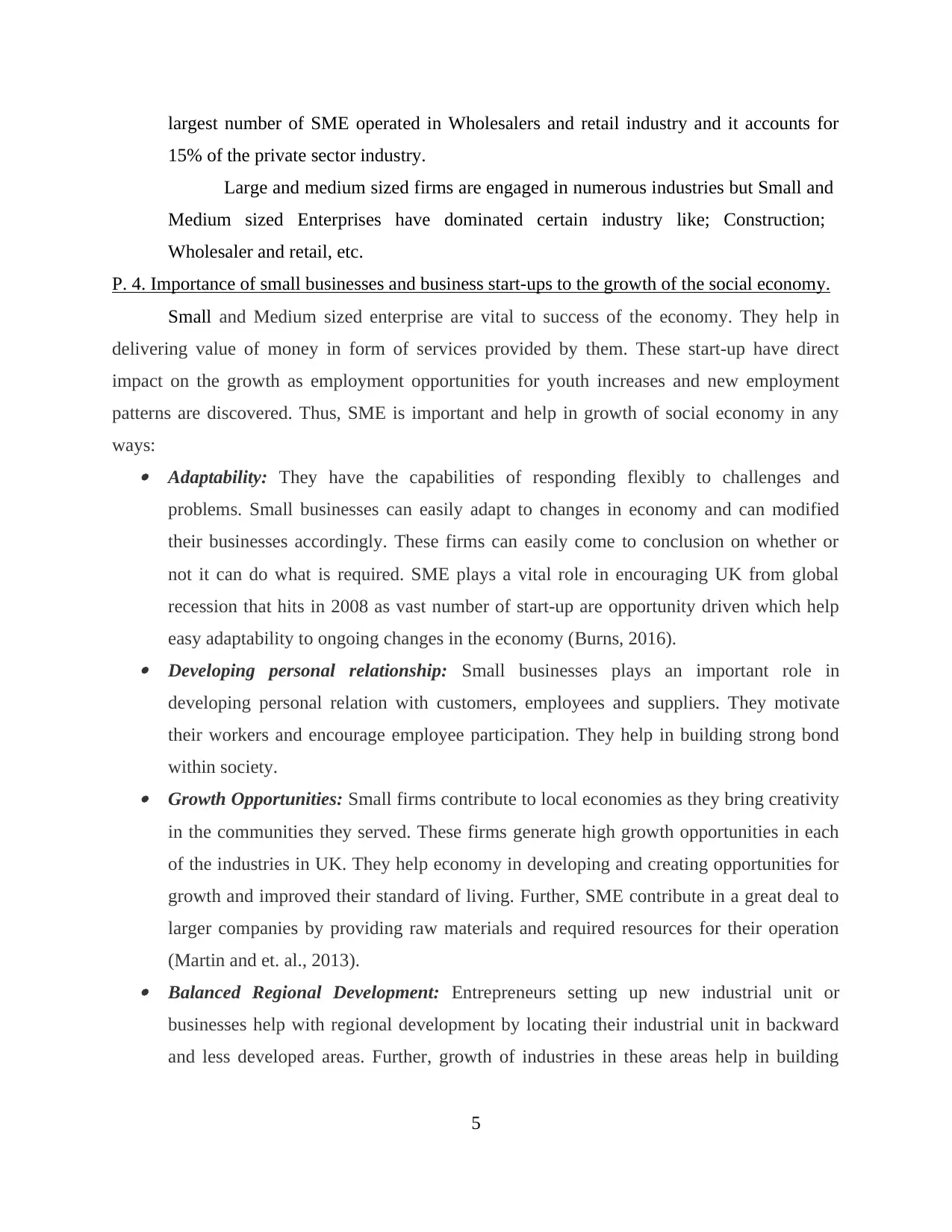
largest number of SME operated in Wholesalers and retail industry and it accounts for
15% of the private sector industry.
Large and medium sized firms are engaged in numerous industries but Small and
Medium sized Enterprises have dominated certain industry like; Construction;
Wholesaler and retail, etc.
P. 4. Importance of small businesses and business start-ups to the growth of the social economy.
Small and Medium sized enterprise are vital to success of the economy. They help in
delivering value of money in form of services provided by them. These start-up have direct
impact on the growth as employment opportunities for youth increases and new employment
patterns are discovered. Thus, SME is important and help in growth of social economy in any
ways: Adaptability: They have the capabilities of responding flexibly to challenges and
problems. Small businesses can easily adapt to changes in economy and can modified
their businesses accordingly. These firms can easily come to conclusion on whether or
not it can do what is required. SME plays a vital role in encouraging UK from global
recession that hits in 2008 as vast number of start-up are opportunity driven which help
easy adaptability to ongoing changes in the economy (Burns, 2016). Developing personal relationship: Small businesses plays an important role in
developing personal relation with customers, employees and suppliers. They motivate
their workers and encourage employee participation. They help in building strong bond
within society. Growth Opportunities: Small firms contribute to local economies as they bring creativity
in the communities they served. These firms generate high growth opportunities in each
of the industries in UK. They help economy in developing and creating opportunities for
growth and improved their standard of living. Further, SME contribute in a great deal to
larger companies by providing raw materials and required resources for their operation
(Martin and et. al., 2013). Balanced Regional Development: Entrepreneurs setting up new industrial unit or
businesses help with regional development by locating their industrial unit in backward
and less developed areas. Further, growth of industries in these areas help in building
5
15% of the private sector industry.
Large and medium sized firms are engaged in numerous industries but Small and
Medium sized Enterprises have dominated certain industry like; Construction;
Wholesaler and retail, etc.
P. 4. Importance of small businesses and business start-ups to the growth of the social economy.
Small and Medium sized enterprise are vital to success of the economy. They help in
delivering value of money in form of services provided by them. These start-up have direct
impact on the growth as employment opportunities for youth increases and new employment
patterns are discovered. Thus, SME is important and help in growth of social economy in any
ways: Adaptability: They have the capabilities of responding flexibly to challenges and
problems. Small businesses can easily adapt to changes in economy and can modified
their businesses accordingly. These firms can easily come to conclusion on whether or
not it can do what is required. SME plays a vital role in encouraging UK from global
recession that hits in 2008 as vast number of start-up are opportunity driven which help
easy adaptability to ongoing changes in the economy (Burns, 2016). Developing personal relationship: Small businesses plays an important role in
developing personal relation with customers, employees and suppliers. They motivate
their workers and encourage employee participation. They help in building strong bond
within society. Growth Opportunities: Small firms contribute to local economies as they bring creativity
in the communities they served. These firms generate high growth opportunities in each
of the industries in UK. They help economy in developing and creating opportunities for
growth and improved their standard of living. Further, SME contribute in a great deal to
larger companies by providing raw materials and required resources for their operation
(Martin and et. al., 2013). Balanced Regional Development: Entrepreneurs setting up new industrial unit or
businesses help with regional development by locating their industrial unit in backward
and less developed areas. Further, growth of industries in these areas help in building
5
⊘ This is a preview!⊘
Do you want full access?
Subscribe today to unlock all pages.

Trusted by 1+ million students worldwide
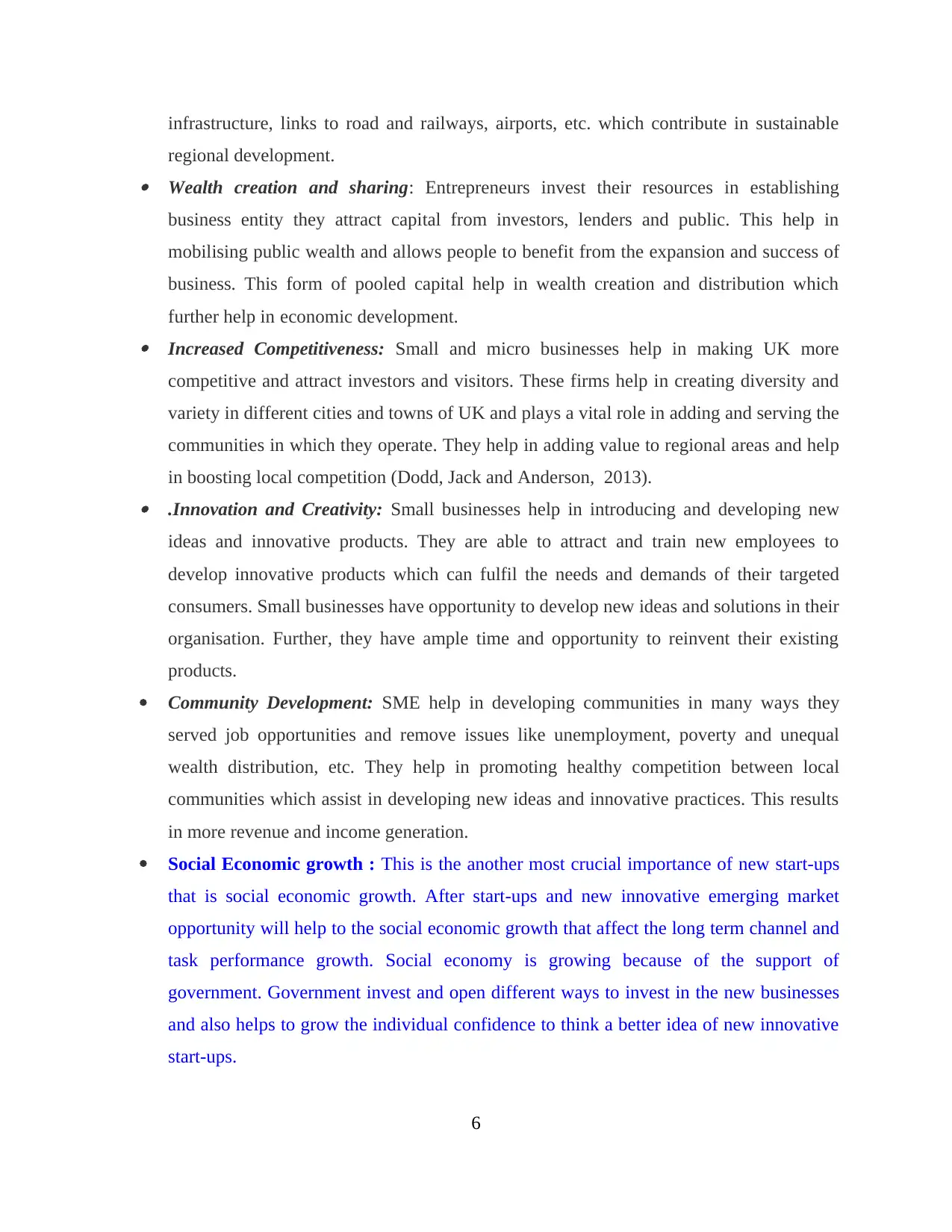
infrastructure, links to road and railways, airports, etc. which contribute in sustainable
regional development. Wealth creation and sharing: Entrepreneurs invest their resources in establishing
business entity they attract capital from investors, lenders and public. This help in
mobilising public wealth and allows people to benefit from the expansion and success of
business. This form of pooled capital help in wealth creation and distribution which
further help in economic development. Increased Competitiveness: Small and micro businesses help in making UK more
competitive and attract investors and visitors. These firms help in creating diversity and
variety in different cities and towns of UK and plays a vital role in adding and serving the
communities in which they operate. They help in adding value to regional areas and help
in boosting local competition (Dodd, Jack and Anderson, 2013). .Innovation and Creativity: Small businesses help in introducing and developing new
ideas and innovative products. They are able to attract and train new employees to
develop innovative products which can fulfil the needs and demands of their targeted
consumers. Small businesses have opportunity to develop new ideas and solutions in their
organisation. Further, they have ample time and opportunity to reinvent their existing
products.
Community Development: SME help in developing communities in many ways they
served job opportunities and remove issues like unemployment, poverty and unequal
wealth distribution, etc. They help in promoting healthy competition between local
communities which assist in developing new ideas and innovative practices. This results
in more revenue and income generation.
Social Economic growth : This is the another most crucial importance of new start-ups
that is social economic growth. After start-ups and new innovative emerging market
opportunity will help to the social economic growth that affect the long term channel and
task performance growth. Social economy is growing because of the support of
government. Government invest and open different ways to invest in the new businesses
and also helps to grow the individual confidence to think a better idea of new innovative
start-ups.
6
regional development. Wealth creation and sharing: Entrepreneurs invest their resources in establishing
business entity they attract capital from investors, lenders and public. This help in
mobilising public wealth and allows people to benefit from the expansion and success of
business. This form of pooled capital help in wealth creation and distribution which
further help in economic development. Increased Competitiveness: Small and micro businesses help in making UK more
competitive and attract investors and visitors. These firms help in creating diversity and
variety in different cities and towns of UK and plays a vital role in adding and serving the
communities in which they operate. They help in adding value to regional areas and help
in boosting local competition (Dodd, Jack and Anderson, 2013). .Innovation and Creativity: Small businesses help in introducing and developing new
ideas and innovative products. They are able to attract and train new employees to
develop innovative products which can fulfil the needs and demands of their targeted
consumers. Small businesses have opportunity to develop new ideas and solutions in their
organisation. Further, they have ample time and opportunity to reinvent their existing
products.
Community Development: SME help in developing communities in many ways they
served job opportunities and remove issues like unemployment, poverty and unequal
wealth distribution, etc. They help in promoting healthy competition between local
communities which assist in developing new ideas and innovative practices. This results
in more revenue and income generation.
Social Economic growth : This is the another most crucial importance of new start-ups
that is social economic growth. After start-ups and new innovative emerging market
opportunity will help to the social economic growth that affect the long term channel and
task performance growth. Social economy is growing because of the support of
government. Government invest and open different ways to invest in the new businesses
and also helps to grow the individual confidence to think a better idea of new innovative
start-ups.
6
Paraphrase This Document
Need a fresh take? Get an instant paraphrase of this document with our AI Paraphraser
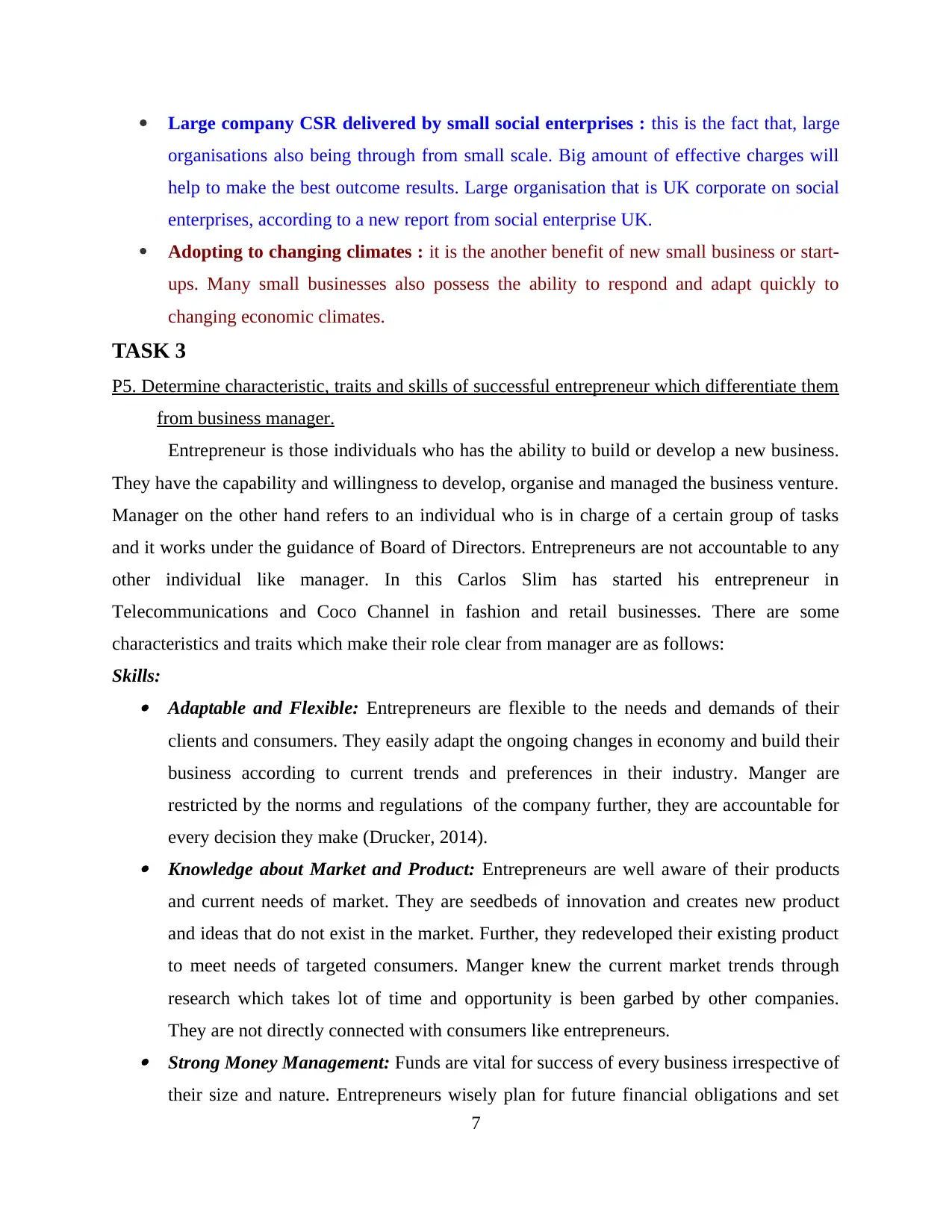
Large company CSR delivered by small social enterprises : this is the fact that, large
organisations also being through from small scale. Big amount of effective charges will
help to make the best outcome results. Large organisation that is UK corporate on social
enterprises, according to a new report from social enterprise UK.
Adopting to changing climates : it is the another benefit of new small business or start-
ups. Many small businesses also possess the ability to respond and adapt quickly to
changing economic climates.
TASK 3
P5. Determine characteristic, traits and skills of successful entrepreneur which differentiate them
from business manager.
Entrepreneur is those individuals who has the ability to build or develop a new business.
They have the capability and willingness to develop, organise and managed the business venture.
Manager on the other hand refers to an individual who is in charge of a certain group of tasks
and it works under the guidance of Board of Directors. Entrepreneurs are not accountable to any
other individual like manager. In this Carlos Slim has started his entrepreneur in
Telecommunications and Coco Channel in fashion and retail businesses. There are some
characteristics and traits which make their role clear from manager are as follows:
Skills: Adaptable and Flexible: Entrepreneurs are flexible to the needs and demands of their
clients and consumers. They easily adapt the ongoing changes in economy and build their
business according to current trends and preferences in their industry. Manger are
restricted by the norms and regulations of the company further, they are accountable for
every decision they make (Drucker, 2014). Knowledge about Market and Product: Entrepreneurs are well aware of their products
and current needs of market. They are seedbeds of innovation and creates new product
and ideas that do not exist in the market. Further, they redeveloped their existing product
to meet needs of targeted consumers. Manger knew the current market trends through
research which takes lot of time and opportunity is been garbed by other companies.
They are not directly connected with consumers like entrepreneurs. Strong Money Management: Funds are vital for success of every business irrespective of
their size and nature. Entrepreneurs wisely plan for future financial obligations and set
7
organisations also being through from small scale. Big amount of effective charges will
help to make the best outcome results. Large organisation that is UK corporate on social
enterprises, according to a new report from social enterprise UK.
Adopting to changing climates : it is the another benefit of new small business or start-
ups. Many small businesses also possess the ability to respond and adapt quickly to
changing economic climates.
TASK 3
P5. Determine characteristic, traits and skills of successful entrepreneur which differentiate them
from business manager.
Entrepreneur is those individuals who has the ability to build or develop a new business.
They have the capability and willingness to develop, organise and managed the business venture.
Manager on the other hand refers to an individual who is in charge of a certain group of tasks
and it works under the guidance of Board of Directors. Entrepreneurs are not accountable to any
other individual like manager. In this Carlos Slim has started his entrepreneur in
Telecommunications and Coco Channel in fashion and retail businesses. There are some
characteristics and traits which make their role clear from manager are as follows:
Skills: Adaptable and Flexible: Entrepreneurs are flexible to the needs and demands of their
clients and consumers. They easily adapt the ongoing changes in economy and build their
business according to current trends and preferences in their industry. Manger are
restricted by the norms and regulations of the company further, they are accountable for
every decision they make (Drucker, 2014). Knowledge about Market and Product: Entrepreneurs are well aware of their products
and current needs of market. They are seedbeds of innovation and creates new product
and ideas that do not exist in the market. Further, they redeveloped their existing product
to meet needs of targeted consumers. Manger knew the current market trends through
research which takes lot of time and opportunity is been garbed by other companies.
They are not directly connected with consumers like entrepreneurs. Strong Money Management: Funds are vital for success of every business irrespective of
their size and nature. Entrepreneurs wisely plan for future financial obligations and set
7
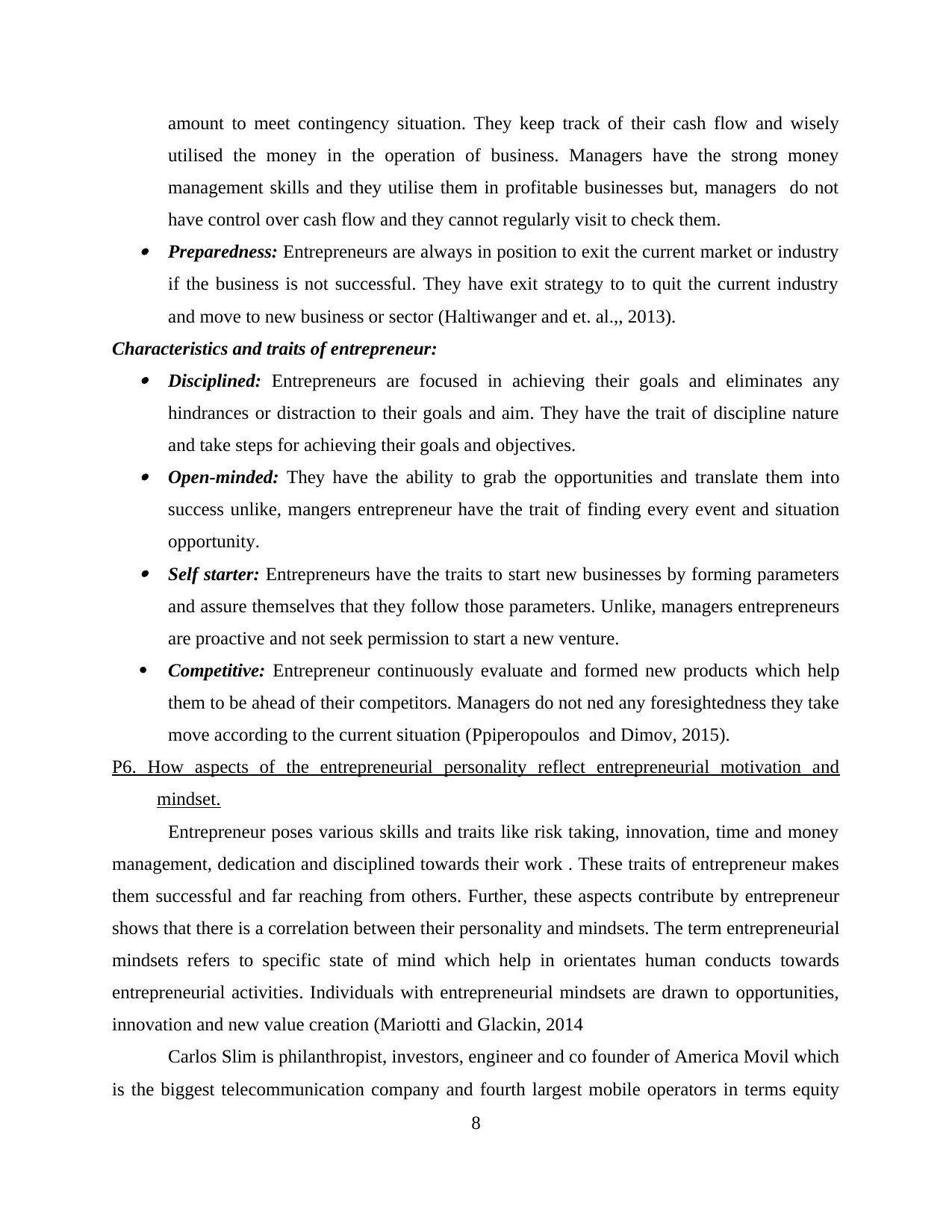
amount to meet contingency situation. They keep track of their cash flow and wisely
utilised the money in the operation of business. Managers have the strong money
management skills and they utilise them in profitable businesses but, managers do not
have control over cash flow and they cannot regularly visit to check them. Preparedness: Entrepreneurs are always in position to exit the current market or industry
if the business is not successful. They have exit strategy to to quit the current industry
and move to new business or sector (Haltiwanger and et. al.,, 2013).
Characteristics and traits of entrepreneur: Disciplined: Entrepreneurs are focused in achieving their goals and eliminates any
hindrances or distraction to their goals and aim. They have the trait of discipline nature
and take steps for achieving their goals and objectives. Open-minded: They have the ability to grab the opportunities and translate them into
success unlike, mangers entrepreneur have the trait of finding every event and situation
opportunity. Self starter: Entrepreneurs have the traits to start new businesses by forming parameters
and assure themselves that they follow those parameters. Unlike, managers entrepreneurs
are proactive and not seek permission to start a new venture.
Competitive: Entrepreneur continuously evaluate and formed new products which help
them to be ahead of their competitors. Managers do not ned any foresightedness they take
move according to the current situation (Ppiperopoulos and Dimov, 2015).
P6. How aspects of the entrepreneurial personality reflect entrepreneurial motivation and
mindset.
Entrepreneur poses various skills and traits like risk taking, innovation, time and money
management, dedication and disciplined towards their work . These traits of entrepreneur makes
them successful and far reaching from others. Further, these aspects contribute by entrepreneur
shows that there is a correlation between their personality and mindsets. The term entrepreneurial
mindsets refers to specific state of mind which help in orientates human conducts towards
entrepreneurial activities. Individuals with entrepreneurial mindsets are drawn to opportunities,
innovation and new value creation (Mariotti and Glackin, 2014
Carlos Slim is philanthropist, investors, engineer and co founder of America Movil which
is the biggest telecommunication company and fourth largest mobile operators in terms equity
8
utilised the money in the operation of business. Managers have the strong money
management skills and they utilise them in profitable businesses but, managers do not
have control over cash flow and they cannot regularly visit to check them. Preparedness: Entrepreneurs are always in position to exit the current market or industry
if the business is not successful. They have exit strategy to to quit the current industry
and move to new business or sector (Haltiwanger and et. al.,, 2013).
Characteristics and traits of entrepreneur: Disciplined: Entrepreneurs are focused in achieving their goals and eliminates any
hindrances or distraction to their goals and aim. They have the trait of discipline nature
and take steps for achieving their goals and objectives. Open-minded: They have the ability to grab the opportunities and translate them into
success unlike, mangers entrepreneur have the trait of finding every event and situation
opportunity. Self starter: Entrepreneurs have the traits to start new businesses by forming parameters
and assure themselves that they follow those parameters. Unlike, managers entrepreneurs
are proactive and not seek permission to start a new venture.
Competitive: Entrepreneur continuously evaluate and formed new products which help
them to be ahead of their competitors. Managers do not ned any foresightedness they take
move according to the current situation (Ppiperopoulos and Dimov, 2015).
P6. How aspects of the entrepreneurial personality reflect entrepreneurial motivation and
mindset.
Entrepreneur poses various skills and traits like risk taking, innovation, time and money
management, dedication and disciplined towards their work . These traits of entrepreneur makes
them successful and far reaching from others. Further, these aspects contribute by entrepreneur
shows that there is a correlation between their personality and mindsets. The term entrepreneurial
mindsets refers to specific state of mind which help in orientates human conducts towards
entrepreneurial activities. Individuals with entrepreneurial mindsets are drawn to opportunities,
innovation and new value creation (Mariotti and Glackin, 2014
Carlos Slim is philanthropist, investors, engineer and co founder of America Movil which
is the biggest telecommunication company and fourth largest mobile operators in terms equity
8
⊘ This is a preview!⊘
Do you want full access?
Subscribe today to unlock all pages.

Trusted by 1+ million students worldwide
1 out of 17
Related Documents
Your All-in-One AI-Powered Toolkit for Academic Success.
+13062052269
info@desklib.com
Available 24*7 on WhatsApp / Email
![[object Object]](/_next/static/media/star-bottom.7253800d.svg)
Unlock your academic potential
Copyright © 2020–2026 A2Z Services. All Rights Reserved. Developed and managed by ZUCOL.




